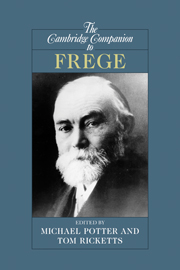Book contents
- Frontmatter
- 1 Introduction
- 2 Understanding Frege’s project
- 3 Frege’s conception of logic
- 4 Dummett’s Frege
- 5 What is a predicate?
- 6 Concepts, objects and the Context Principle
- 7 Sense and reference: the origins and development of the distinction
- 8 On sense and reference: a critical reception
- 9 Frege and semantics
- 10 Frege’s mathematical setting
- 11 Frege and Hilbert
- 12 Frege’s folly: bearerless names and Basic Law V
- 13 Frege and Russell
- 14 Inheriting from Frege: the work of reception, as Wittgenstein did it
- Bibliography
- Index
- Series List
4 - Dummett’s Frege
Published online by Cambridge University Press: 28 September 2010
- Frontmatter
- 1 Introduction
- 2 Understanding Frege’s project
- 3 Frege’s conception of logic
- 4 Dummett’s Frege
- 5 What is a predicate?
- 6 Concepts, objects and the Context Principle
- 7 Sense and reference: the origins and development of the distinction
- 8 On sense and reference: a critical reception
- 9 Frege and semantics
- 10 Frege’s mathematical setting
- 11 Frege and Hilbert
- 12 Frege’s folly: bearerless names and Basic Law V
- 13 Frege and Russell
- 14 Inheriting from Frege: the work of reception, as Wittgenstein did it
- Bibliography
- Index
- Series List
Summary
INTRODUCTION
It has become standard for commentators to note sadly how little impact Frege's work had amongst his contemporaries, but then to temper this observation by claiming an enormous indirect influence for his ideas through the work of those few who did pay serious attention to them, perhaps most notably Russell, Wittgenstein and Carnap. How effective or transparent those conduits were is still a matter of scholarly debate. For myself, I am increasingly persuaded that much of what we would now judge to be most centrally important in Frege was at best imperfectly transmitted.
That we can now attempt judgement on what is thus central is owed, in the first place, to the republication and translation of Frege's work that effectively began with Austin's version of Grundlagen in 1950. Austin had translated the work so as to be able to set it for an Oxford finals paper. Michael Dummett took the course, and was, he reports, 'bowled over by the Grundlagen', so much so that during the following year he 'settled down to read everything that Frege had written'. Soon, though not at first, Geach and Black’s Translations (1952) would help in this, but before long the work would take Dummett to Munster to examine Frege’s unpublished work: the fi rst result of this study is the 1956 ‘Postscript’ to his 1955 ‘Frege on functions’, itself an important early step in dispelling bizarre misconceptions of Frege’s doctrines which seem then to have been prevalent. Dummett began to form plans for a comprehensive book on Frege. This required further sustained study of the Nachlass, including a visit in 1957 when, its editors acknowledge, Dummett provided an important stimulus and essential ‘spadework’ ( PW, p. xii) towards its publication.
- Type
- Chapter
- Information
- The Cambridge Companion to Frege , pp. 86 - 117Publisher: Cambridge University PressPrint publication year: 2010
- 4
- Cited by

